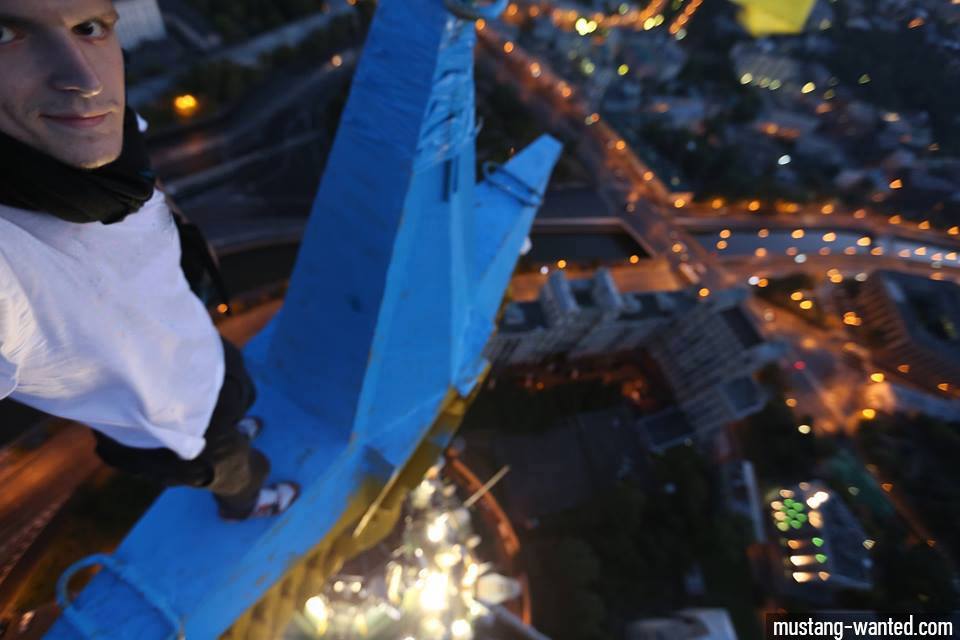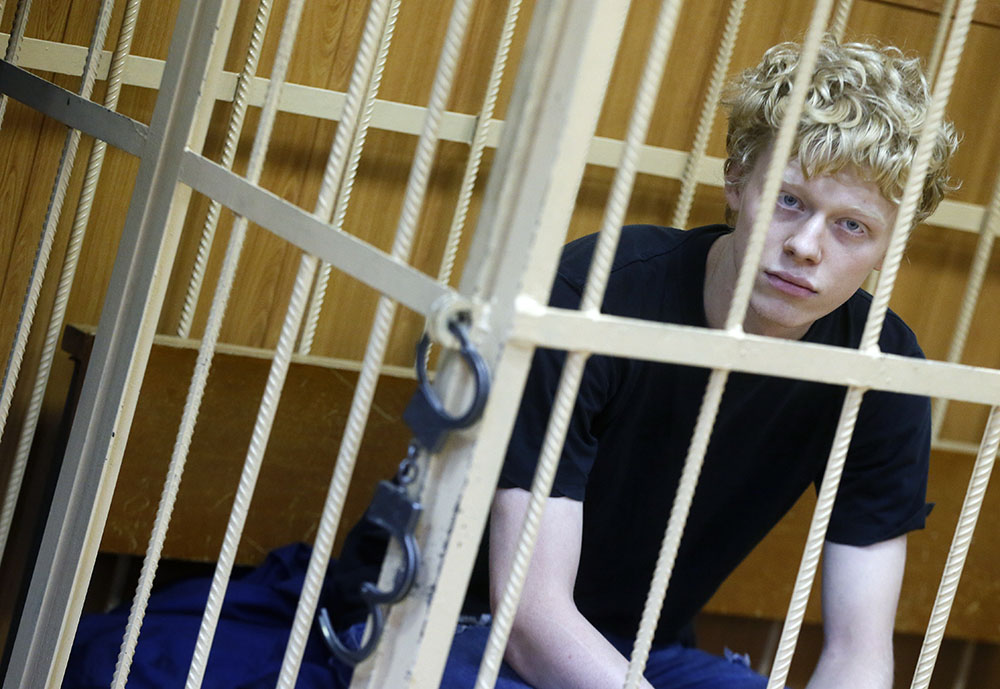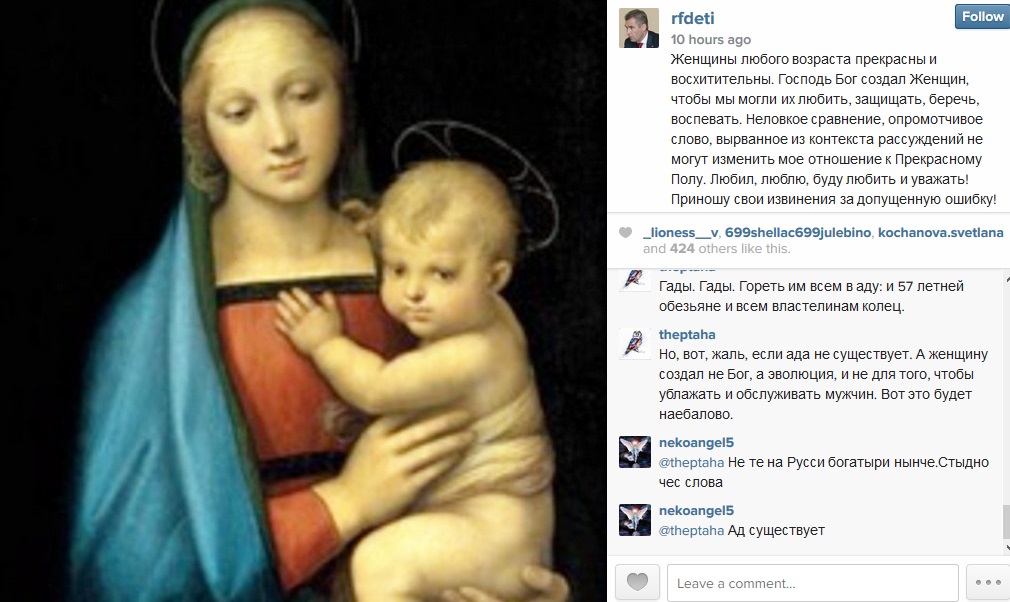The prosecutor has been changed in the murder investigation of slain opposition leader Boris Nemtsov.
Welcome to our column, Russia Update, where we will be closely following day-to-day developments in Russia, including the Russian government’s foreign and domestic policies.
The previous issue is here.
UPDATES BELOW
Russia This Week:
– From Medal of Valor to Ubiquitous Propaganda Symbol: the History of the St. George Ribbon
– What Happened to the Slow-Moving Coup?
– Can We Be Satisfied with the Theory That Kadyrov Killed Nemtsov?
– All the Strange Things Going On in Moscow
Special features:
– With Cash and Conspiracy Theories, Russian Orthodox Philanthropist Malofeyev is Useful to the Kremlin
– Alexey Navalny On the Murder of Boris Nemtsov
– Theories about Possible Perpetrators of the Murder of Boris Nemtsov
– Novaya Gazeta Releases Sensational Kremlin Memo
Please help The Interpreter to continue providing this valuable information service by making a donation towards our costsâ€.
Remember the stunning stunt last year, when supposedly activists painted the star atop one of Moscow’s Stalin Gothic buildings in the blue and yellow colors of the Ukrainian flag and parachuted off the building — and then got arrested?

Photo by Martin (George Malets)
The star could be seen for miles and many people snapped pictures of it and it was widely covered in the Russian and international media.

Photo by ITAR-TASS
Actually, there were several twists to that story, and it was more complicated than it seemed — and in fact involved two separate incidents.
The star painted was on one of 7 Stalin-era buildings known in the West (but not in Russia) as “the Seven Sisters”. In Russian, they are called the Stalinskiye vysotki (“Stalinist skyscrapers”); the one painted is called Kotelnicheskaya Embankment for its location.
The person who actually did the paint job is Pavel Ushibets, a “roofer” (as such dare-devil climbers are known) nicknamed “Grisha Mustang” or “Mustang Wanted”. He managed to slip away after doing the deed — and even sold pictures of his stunt to LifeNews –– and then went ahead and published them anyway on his own Facebook page, infuriating Arom Gabrelyanov, the owner of LifeNews, the pro-Kremlin TV channel.

He went on to cause further scandal by revealing that he was sending the funds to Donbass Battalion, which was fighting in the war in Ukraine, at that time under the command of Semyon Semyonchenko.
Mustang himself was incorrectly described as member of a European neo-Nazi group, but he did in fact fight as a member of the Ukrainian volunteer Azov Battalion, notorious for its neo-Nazi views and insignia.
The man taking the selfie here — whose picture was seen round the world — isn’t Mustang, but a city worker sent to repaint the star.
Translation: Roofer “Mustang Wanted” helped LifeNews to transfer $5,000 to the Donbass Battalion.
Mustang then went back to fight with Azov and is still fighting today, as a reporter recently tweeted.
But the people arrested and charged with the pro-Ukrainian stunt are still under house arrest — although
they say they were not the perpetrators, and Mustang himself has come
out and confessed to the act.
As Yod News reports today citing Media Zone, the Tagansky District Court extended their house arrest until July 20. One of them, Vladimir Podrezov, age 19, is in pre-trial detention. Four others Aleksandr Pogrebov, Aleksei Shirokozhykov, Yevgeniya Korotkova and Anna Lepeshkina — are under house arrest. They say they were all doing a base jump from the top of the building that same day when Mustang painted the star.
But they deny any involvement in painting the star. They have all been accused of vandalism and “hooliganism” with the aggravating circumstance of “with motives of political and ideological hatred.”
Memorial Society, Russia’s largest human rights group, has declared all five as political prisoners and urged their release.

Vladimir Podrezov. Photo by Gazeta.ru
Podrezov, also described as a “roofer,” is a native of St. Petersburg and son of a single mother. He completed 11th grade, but had not taken his exams yet, although he intended to go to university. He had a prior arrest for theft in 2011 but was given a suspended sentence and community service. He said that he had a job as the administrator of an Internet site.
Given that he is a repeat offender and charged both with “hooliganism” (up to 7 years in prison) and “vandalism” (up to 3 years in prison) with the added dimension of “for motives of ideological and political hatred,” he could face up to 10 years in prison. His lawyer has called this “double jeopardy” and also pointed out that his connection to the parachutists is not established.
There is a sixth defendant in the case, Kirill Ishutin, also accused of the same charges for the base-jumping, but since drugs were found in his apartment, he is facing additional penalties if found guilty and is not considered by human rights groups as a political prisoner.
Although human rights groups and the independent media keep raising the case and pointing out that Mustang, not the base-jumpers, painted the star, authorities have been deaf to their pleas and have refused to look at any testimony that could mean significantly lesser sentences for these people.
Aleksandr Karpukhin, the father of Aleksei Shirokozykhov, has been most vocal in campaigning for his son and the defendants as a group. In an interview with Darina Shevchenko of Yod News last year, he explained that house arrest might seem much preferable to prison, but it is indeed onerous as the defendants cannot work, go to school, or associate with anyone but their immediate families and law-enforcers. They are not allowed to use the Internet or mobile phones.

Aleksandr Karpukhin. Photo by Georgy Sultanov/Yod News.
Karpukhin said he had his own connections to law-enforcement and worked them actively, but was told that there was nothing to be done because the case was decided “at the very top.”
As Karpukhin told Yod News (translation by The Interpreter):
I feel sorry for the investigator — a good man who is working for the system and himself is its victim. The law-enforcers, when you see them one-on-one, are always nice people, but on duty they turn into wolves. When our kids were arrested, they began to be put very heavy pressure on them. At the Tagansky precinct, they took away their outer clothing, they didn’t givem them water, they didn’t allow them to phone their parents, and said, ‘We’ll organize some evidence for you jumpers quickly.’ The interrogators tried to turn the kids against each other, so that they would give testimony on each other. After Mustang and that drug-user roofer said they didn’t know our kids, they stopped pressuring them.
To add to his difficulties, under Russian law, a person assigned to house arrest has to serve that punishment in the place where they are registered under the Russian propiska or registration system which still remains from the Soviet era. In this case, Aleksei was registered in an apartment which his parents had actually rented out to other people to make some income. So they were forced to kick out their tenants, lose the income, and install their son at that address again. They offered to give up their own apartment to the tenants but they moved on. Their son spends most days alone among the four walls with nothing to do in between visits to his parole officers or interrogators. Karpukhin said he lectured his son many times that the base-jumping stunts would end badly in injury or worse — and they have.
Karpukhin said he looked for lawyers and then via Twitter, turned to advice to Pavel Chikin, an attorney known for taking hard-luck human rights cases. He then rejected Chikin’s suggestion of a certain lawyer known for defending a prominent opposition blogger because he wanted to avoid any extra baggage in dealing with the authorities. He said he had already spent 300,000 rubles ($6,000) on lawyers, but wasn’t complaining because he worked and his son had also had a good job as an architect and had some savings.
The experience of Karpukhin indicates an important facet of life for ordinary people trying to deal with rampant injustice in Russia — the fragile civil society institutions of independent lawyers and journalists who try to combat unfairness are believed to hurt rather than help them.
I will not organize rallies and pickets in defense of my son. I was also outraged by the dishonest elections and I believe that the Pussy Riot members should not sit behind bars but…the majority of residents of Russia support Putin. The protesting minority are called traditors of the Motherland, a fifth column and simply insane. I don’t want NTV or LifeNews to film me with a poster and broadcast a show saying, here’s this poor papa, he has no more hope. If the trial turns into the worst-case scenario, I will resolve that issue on the legal plane and write letters to various government offices. I’ve already written to Putin.
Karpukhin said that he himself had begun to be harassed; a bank began calling him repeatedly and demanding that he pay back a loan that he had never taken. That moved him to write to Putin, a letter which then was registered at the local prosecutor’s office, and then the phone calls stopped.
Asked how he coped with this injustice, Karpukhin said, “I’m somewhat reassured by the fact that the investigator, prosecutor and judge will slowly burn in hell.”
— Catherine A. Fitzpatrick
Latvia is warning that the their navy has spotted a Russian naval corvette just 11 kilometers from its international waters. 24 Today reports:
According to the latest NBS posting, the ship Zarechny belongs to the Tarantul-class type of small warship.
It is not the first time when Russian ships come close to the Baltic state borders. On March 16 Latvian armed forces spotted a Russian submarine in the exclusive economic zone of Latvia on March 16, the BBC’s Ukrainian Service has reported. Also in November 2014 and February 2015 submarines and corvettes of the Russian navy appeared in the exclusive economic zone of Latvia.
The website Russian Navy writes this about the Zarechny:
R-187 (hull number 855) is a Project 12411 missile boat designed for destruction of enemy warships, transport and assult vessels, terrorist groups in the sea and in the bases; protection of ships and vessels from surface and air attacks.
A file photo from transalternativa.ru:

Just yesterday, two British jets were scrambled to intercept Russian strategic bombers flying close to British airspace:
The State Duma or parliament of Russia has passed in the second reading of a law on “undesirable organizations,” RBC.ru reports. The vote was 442 in favor and 3 opposed. The draft will go through a third and final reading before being sent for the president’s signature.
Aleksandr Tarnavsky, a deputy of Just Russia, proposed the law aimed against foreign organizations which “fulfill the tasks of their special services [intelligence agencies] acting out of personal enmity toward Russia” or which “want to buy up Russia on the cheap,” RBC.ru reported.
Anyone found violating the law can be subjected to a range of administrative and criminal penalties. Foreigners may be barred from entry to Russia. Any Russian citizen who takes funds or property from such organizations can be subject to a fine.
The law takes the concept of “foreign agents” used until now only on those groups that received grants from abroad and were viewed as engaging in political activity and now spreads it to anyone dealing with foreigners in any capacity even without grants, if they are deemed as unacceptable to the Russian government.
One amendment proposed was to make a list of specific foreign or international non-governmental organizations and not just leave it open to any organization found to be undesirable because that might impact commercial companies. So far, the NGOs were only defined as a generic concept, and it’s not clear yet what the list of groups will be.
— Catherine A. Fitzpatrick
Pavel Astakhov, Russia’s controversial children’s rights ombudsman, has dug himself in deeper with the saga around the ongoing scandal of Nazhud Guchigov, the 57-year-old police chief in a Chechen village who is planning to marry Luisa Goylabiyeva, a 17-year-old village girl.
Marriage under 18 in Russia is legal if local authorities give consent. Since the chief of police is involved, the “government consent” issue isn’t at stake, but there have been numerous concerns expressed by the girls’ friends and relatives and now liberal independent journalists and human rights activists in Moscow. When Novaya Gazeta began investigating the story on the basis of appeals from the girl’s concerned friends, reporters were first told the marriage was cancelled but then yesterday informed it was scheduled again — with the blessing of Chechen leader Ramzan Kadyrov.
Astakhov’s contribution in ensuring this scandal fills headlines daily has been to flip-flop in his emphasis on the issues. Early in the scandal two weeks ago, he simply reiterated the law and sounded insensitive to the concerns about the consent of the girl, known as Khedi. Then later he conceded that child marriage was a problem in Chechnya, and said he would soon make a visit to Chechnya to discuss with strongman leader Ramzan Kadyrov what could be done about this.
Then, possibly under pressure from the backlash that inevitably came from Grozny, Astakhov then backtracked and said that people shouldn’t interview in the family’s privacy and their marriage plans were their business. As we reported yesterday, he then implied that marriage of teens was a tradition in Chechnya and that in their culture implying the hardships of their lives, a woman at 27 was already as wrinkled as a 50-year-old in Moscow.
“Don’t be hypocrites,” cautioned Astakhov (translation by The Interpreter):
“There are places where women are wrinkled already at 27 years and by our standards they look about 50. But on the whole the Constitution forbids interfering in the private lives of citizens.”
This was seen not only as sexist but racist against Chechens, and ensured another round of scandal as human rights activists howled about the remark.
So today Astakhov apologised on Instagram — although in a “family values” manner that some will find sexist even in the Russian cultural context, ensuring the scandal will live on:
Women of any age are beautiful and delightful. The Lord God created women so that we could love, protect, cherish and praise them.
An awkward comparison, a fleeting word, torn from the context of discussions cannot change my attitude to the Fair Sex. I have loved, love, will love and respect! I beg forgiveness of the mistake I made!

Several readers of his timeline on Instagram asked why, if he loved and respect women, in this case he wasn’t taking action to protect this young Chechen girl; one reader made the point that evolution, not the Creator, made women.
Astakhov gained notoriety when he spear-headed President Vladimir Putin’s backlash to the Magnitsky List of persons sanctioned for mass human rights violations by placing a ban on US adoptions of Russian children, including some that were near completion.
— Catherine A. Fitzpatrick
Shamsudin Tsakayev, the attorney for Zaur Dadayev, the chief suspect in the murder of opposition leader Boris Nemtsov, has been replaced, Caucasian Knot reported.
Igor Krasnov, a prominent special cases investigator has been taken off the case in connection with a promotion, and replaced with Nikolai Tutevich, says Tsakayev.
It is not clear what promotion could be involved, given that President Vladimir Putin appointed Krasnov to head the investigation group and the Nemtsov case — among the highest-profile criminal cases in Russia currently.
But if the Kremlin wanted to ensure a certain direction of the investigation — a version involving Chechen suspects — it may be motivated to change investigators.
Krasnov is known for his work on the murders of Stanislav Markelov and journalist Anastasiya Baburova, killed by the violent ultranationalist group BORN (Battle Organization of Russian Nationalists). He also investigated the case of the assassination attempt on Anatoly Chubais, head of RAO UES.
Tutevich is known for investigating the case of the murder of Ruslan Yamadayev, a Chechen who was the former commander of the GRU’s Vostok Batallion. As Caucasian Knot reported in the past, Yamadayev was killed when a group of unknown men shot him dead when he had stopped at a stoplight. Three Chechens, Aslanbek Dadayev, Elimpashi Khatsuyev and Timur Isayev were sentenced for that murder. But the mastermind was never found in the Yamadayev case. (The Dadayev in that case does not appear to be related to Zaur Dadayev in Nemtsov’s case.)
The Dubai police believe Senator Adam Demlikhanov was involved in ordering the hit on Yamadayev; he has denied the claim and threatened to sue for libel. Alibek Demlikhanov, a relative of Adam Demlikhanov’s, was the commander of Sever Battalion where Zaur Dadayev served. He was recently transferred from that position as we reported yesterday.
Kommersant says that Tutevich has investigated another case involving Chechens besides the Yamadayev case. He investigated the murder of Chechen crime boss Mustafa Shidayev; in 2009, a military court acquitted Aslan Dilieyv, an advisor of Chechen leader Ramzan Kadyrov, of that crime.
Caucasian Knot has a special section of its website devoted to stories and background on the Nemtsov case.
As we noted yesterday, there has been no news from the investigation in two weeks, and FSB agents and others close to the investigation have stopped leaking information. The five Chechens are still in custody and their pre-trial detention has been extended and none of their petitions accepted although some claim alibis. The Investigative Committee was unable to interrogate Ruslan Geremeyev, another member of the Sever Battalion who may be material to the case but has reportedly fled to the UAE.
— Catherine A. Fitzpatrick